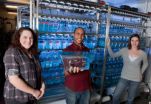(Press-News.org) CORVALLIS, Ore. – It's illegal for businesses and law enforcement to profile a person based on their race, gender, or ethnicity, yet millions of Americans are being profiled every day based on their online consumer behavior and demographics.
Known as consumer profiling for behavioral advertising purposes, this type of profiling is largely unregulated.
The result, according to two recent articles in the journal of Computer Law & Security Review, is that consumers have less privacy and are being targeted by advertisers using increasingly sophisticated measures, which may include efforts to alter behavior based on online tracking and profiling.
The articles examine existing privacy laws to determine how well they protect consumers' privacy and look at possible ways to protect consumer privacy including adopting new laws, using technology to protect privacy and voluntary efforts by the advertising industry.
Nancy King, associate professor of business law at Oregon State University, is lead author on the articles in a two-part series on profiling of mobile customers. King is an expert on privacy issues and e-commerce and has been studying issues related to consumer privacy and data protection for more than a decade.
"Most people do not know they are being tracked, and they aren't given a choice whether to be tracked or to have their online behavior and personal information shared with large networks of advertisers," King said. "Online advertisers may know or make inferences about what neighborhood you live in, your gender and how much money you make and even very intimate details – such as if you are trying to lose weight or where your next vacation is planned – and they use that information to target advertising at you."
In addition to the concerns regarding online behavioral advertising, mobile users have added concerns, King said, because typically only one person uses a particular cell phone and the geographic location of cell phones may also be tracked. So advertising generated through cell phone tracking and profiling may be both personal and location-specific.
King gives a hypothetical example of fast food ads based on profiling teenage customer behavior and demographics that could produce highly-targeted ads sent to teens on their cell phones. These ads can be time- and location-targeted, arriving when teens are likely to be out of school or when they happen to be near fast food restaurants.
Given the concern about obesity in our culture, King said teens and their parents may have legitimate privacy concerns about the impact of these types of ads on teenagers' food choices; yet existing laws do not protect these privacy interests.
"Profiling can manipulate consumers' behavior without them knowing that they have been categorized by advertisers," King said.
King seeks potential solutions to protect consumers' privacy, but she said it is important to avoid privacy solutions that go too far and might unduly restrict the behavioral advertising industry. Often the right balance involves ensuring consumers have enough information and mechanisms in place to protect their privacy.
As it stands now, King said, consumers have little choice whether or not they are tracked or profiled. Online users can disable tracking cookies – software code that is downloaded to your computer by websites that track consumers' behavior – but many websites will not allow users to access their sites if cookies are disabled. And wiping cookies from your computer regularly may not help either.
Web beacons are another tool used to track behavior, but instead of downloading the tracking device to a personal computer, a beacon tracks behavior directly from the website. Web beacons can record almost every individual move of a web user and users have no control over beacons since they reside on the websites that users are visiting.
King said that online behavioral advertising is a new and effective tool to reach potential customers, which is one reason why the privacy issues are as yet unresolved. However, as lawsuits – such as one pending against Facebook for potentially disclosing users' personal data to advertisers – continue to increase, King said it is inevitable that the issue of online and mobile privacy will be addressed, if not by Congress, then by the courts.
"The bottom line is that we as consumers are being tracked and profiled, and it is an invasion of privacy and in some cases gets into issues of social justice," King said. "You are being targeted because you 'look' like someone who may – or may not – be interested in a certain product, but you may never know what the advertiser knows about you that lead to this conclusion."
The implications of consumer profiling go far beyond receipt of targeted advertising. Imagine this scenario: you are on a travel website browsing airline ticket fees, and you decide to do shopping on other websites. You find a good deal on a hotel at your proposed destination, so you make a reservation. A few hours later you re-check the travel site only to notice that the price has increased by $100. Most likely, you have been profiled as a return visitor and a customer who is highly likely to buy an airline ticket, based on online tracking enabled by the cookie that was downloaded to your computer on your first visit to the travel site. So, now the price of those tickets is higher – just for you.
This type of profiling is not currently illegal in the U.S., nor is it known how frequently it may occur.
"You should have the right to surf the Internet and use your mobile phone without being tracked and profiled, and you should be given a choice about whether you want to receive behavioral advertising," King said.
INFORMATION:
The first part of this study was published in the September issue of the Computer Law & Security Review and the second part appeared in the November issue. Pernille Wegener Jessen from Aarhus University in Denmark is co-author of the paper, which was named "Best Academic Paper" recently at a conference in Barcelona for the International Association of IT Lawyers.
END
It is supposed to be cool, colorless, tasteless and odorless. It may not have any pathogens or impair your health. This is the reason why drinking water is put to a whole series of screenings at regular intervals. Now, the AquaBioTox project will be added to create a system for constant real-time drinking water monitoring. At present, the tests required by the German Drinking Water Ordinance are limited to random samples that often only provide findings after hours and are always attuned to specific substances. In contrast, the heart of the AquaBioTox system is a bio-sensor ...
A gene that can cause congenital heart defects has been identified by a team of scientists, including a group from Princeton University. The discovery could lead to new treatments for those affected by the conditions brought on by the birth defect.
Princeton researchers focused on identifying and studying the gene in zebrafish embryos, and the team's work expanded to include collaborations with other groups studying the genetics of mice and people.
"This work really showcases the use of collaborative science and multiple model systems to better understand human disease," ...
AUGUSTA, Ga. – A drug prescribed for Parkinson's disease may also treat restless leg syndrome without the adverse side effects of current therapies, Medical College of Georgia researchers say.
Rasagaline works by prolonging the effect of dopamine, a chemical that transmits signals between nerve cells in the brain. The cause of RLS is unknown, but research suggests a dopamine imbalance. Parkinson's is caused by a dopamine insufficiency.
"The hope is that Rasagaline, because it prolongs the effect of existing dopamine, instead of producing more, will not come with adverse ...
ROCHESTER, Minn. -- Mayo Clinic researchers studied more than 200 children with epilepsy and found that even if the cause of focal-onset seizures cannot be identified and they do not fit into a known epilepsy syndrome, long-term prognosis is still excellent. This study was presented at the American Epilepsy Society's (http://www.aesnet.org/) annual meeting in San Antonio on Dec. 4.
Epilepsy (http://www.mayoclinic.org/epilepsy/) is a disorder characterized by the occurrence of two or more seizures. It affects almost 3 million Americans, and approximately 45,000 children ...
Cleveland - Scientists from South Korea, the United States and Japan analyzed fossil evidence found in South Korea and published research describing a new horned dinosaur. The newly identified genus, Koreaceratops hwaseongensis, lived about 103 million years ago during the late Early Cretaceous period. The specimen is the first ceratopsian dinosaur from the Korean peninsula. The partial skeleton includes a significant portion of the animal's backbone, hip bone, partial hind limbs and a nearly complete tail. Results from the analysis of the specimen were published in ...
PHILADELPHIA - In a study published in the journal Developmental Cell, Sarah Millar PhD, professor of Dermatology and Cell & Developmental Biology at the University of Pennsylvania School of Medicine, and colleagues demonstrate that a pair of enzymes called HDACs are critical to the proper formation of mammalian skin.
The findings, Millar says, not only provide information about the molecular processes underlying skin development, they also suggest a potential anticancer strategy. "Inhibition of these HDAC enzymes might be able to shut down the growth of tumors that ...
Only the fragile chicken egg stands between Americans and a flu pandemic that would claim tens of thousands more lives than are usually lost to the flu each year.
Vaccine production hinges on the availability of hundreds of millions of eggs – and even with the vaccine, flu still claims somewhere around 36,000 lives in the United States during a typical year. Now scientists have taken an important step toward ending the dominance of the oval. In a paper published in the Dec. 6 issue of the journal Vaccine, scientists showed that an experimental flu vaccine grown entirely ...
What: Scientists from the National Institutes of Health have discovered how catheter-related bacterial infection develops and disseminates to become a potentially life-threatening condition. The study, which included research on Staphylococcus epidermidis in mice implanted with catheters, could have important implications for understanding many types of bacterial biofilm infections, including those caused by methicillin-resistant S. aureus (MRSA).
Biofilms are clusters of microbes that almost always are found with healthcare-associated infections (HAIs) involving medical ...
Madison, WI December 6 2010 -- An expansion of soybean production into areas where soybean has seldom, if ever, been grown can be problematic for some farmers. Soils having high pH values and large amounts of calcium and/or magnesium carbonate are notoriously iron deficient. Iron deficient soils in the North Central United States are estimated to reduce soy bean production by 12.5 million bushels every year.
John Wiersma, a researcher at the University of Minnesota Northwest Research and Outreach Center at Crookston, concluded a study examining the effect of nitrogen based ...
CHAPEL HILL, N.C. – A new study finds that combining the newer diabetes drug exenatide with insulin provides better blood sugar control in patients with type 2 diabetes than insulin alone and helps promote weight loss.
"This study may be the best result ever for patients whose diabetes is inadequately controlled on a combination of pills and insulin," said John Buse, MD, PhD, lead author of the study and chief of the Division of Endocrinology and Metabolism in the University of North Carolina at Chapel Hill School of Medicine.
"Until now, it was inconceivable that you ...



